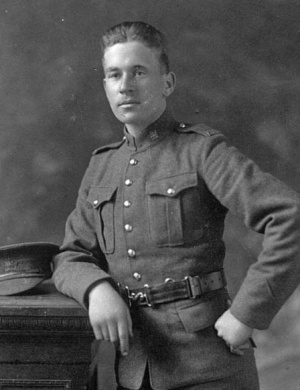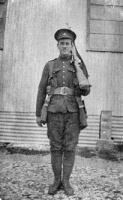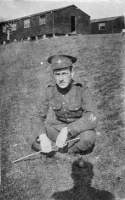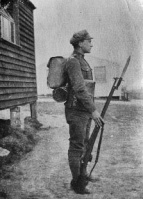Leo Le Boutillier was the great-grandson of John Le Boutillier, an entrepreneur from Jersey who went to the Gaspé in Canada in the early 1800s, and with other Jerseymen organised the inshore Canadian cod fishing industry into a worldwide business.
Canadian Army
Leo volunteered and joined the Canadian Army on 3 November 1914 – at the age of 20. When he enlisted he was a graduate of Loyola College in Montreal and was employed as a bank clerk in Gaspé Harbour, Quebec.
He joined the 24th Battalion, Victoria Rifles in Montreal and sailed with his battalion to England in May 1915. Soon after disembarkation he fell seriously ill and was hospitalised, but he made a full recovery and spent recuperation leave with friends and relations in London. His battalion was sent to France in September 1915, and about a week later moved into the trenches – for the next two years his life would consist of trench warfare, periods of rest behind the lines, and the occasional leave in London – other ranks were only allowed one leave period a year.
A fortnight after his arrival at the front he wrote home: ‘I don’t mind the shells or bullets a bit. I thought I would be scared half to death when I got up here but we have been brought up to the front bit by bit and now we are in the thick of it, we are used to it.
‘It’s good sport listening to the big ones coming. You can hear them coming through the air nearly a half minute before they land so you have lots of time to take cover and if you lie flat you always escape unless the thing lands on you. The hardest part is at night.
‘There are so many snipers around. The Devils are everywhere. One of our chaps got one last night. This sniper took a pot at him so he waited nearly an hour for a chance and let him have it. Poor Mr German is hanging over a limb strapped to the tree yet. I suppose he will remain there until the rats eat him.’
Signaller
He was assigned to a signalling unit. His job was to man the telephone lines and lay and repair the lines in a war zone, making sure that communications were maintained at all times. If the lines went down through artillery barrages he had to run with messages or communicate with flags or lamps – a job made even more difficult by enemy snipers, gas or mortar attacks.
He found his job boring and in 1916 he volunteered to join a scouting unit. Scouts ventured out under the cover of darkness to gather information, to make pathways through no-man’s-land, to gather information on the enemy trenches and to capture any unsuspecting prisoners for interrogation.
He survived fit and well throughout the year, until he met his death from wounds incurred during the Battle of Vimy Ridge – an event that has been called ‘a defining moment’ in Canada’s perception of itself as a nation state, separate from Britain.
He was, during his few short years of service, a popular member of his battalion, nicknamed ‘Boots’. He was recommended for a commission before Vimy, but declined, in case it was thought that he had accepted as an escape route away from the front line.
Leo wrote to a Mrs Amy, the agent for the C S Le Boutillier company in Jersey, who often sent him ‘Jersey cake’, tobacco and extra funds to supplement his private’s wages, until her death in Jersey in 1917. He earned the Distinguished Conduct Medal during the Battle of the Somme. It was a medal regarded as second only to the Victoria Cross.
At Vimy Ridge he was leading the Canadian soldiers to capture the ridge across a four-mile front when he was wounded on the battlefield. At the time he was 100 yards ahead of his troops. As a result of his wounds he died, aged 23 years.
His commanding officer said that ‘his bravery and gallantry was simply magnificent, and his DCM won three or four times over.’
Newspaper reports of Leo’s military exploits always identified him as “from a prominent Jersey family”.
- ‘Leo had reasonable prosperity, a multitude of friends, and a dignified role in the Gaspé community. His future was very bright – if only he could return from the war alive.
- ‘He was one of those who identified with Imperial Britain. He was by social class and economic status a member of an elite who lived in an outpost of English influence at the tip of the Gaspé peninsula.’
Family tree




